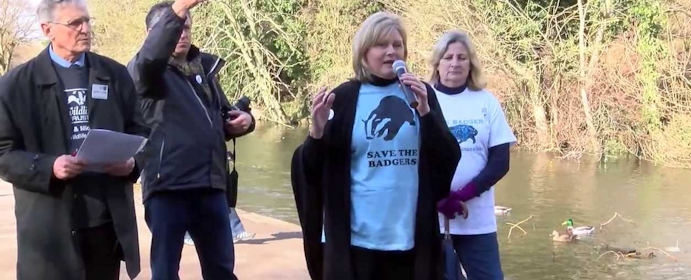Animal welfare statement
24th November 2017
Following the recent misleading headlines over animal sentience, long-time animal rights campaigner and supporter, Anne Main, has reacted to the false accusation that MPs voted to remove recognition that animals are able to feel pain.
'There is absolutely no doubt that animals are sentient.
'For all my political life, and before, I have campaigned on animal welfare issues. Indeed, I myself have introduced bills into parliament that sought to enhance animal welfare, which was scuppered because it clashed with existing EU law.
'One of the reasons I feel so strongly about issues such as the live transportation of animals, and have supported the ban, is precisely because of the emotional distress of animals being crammed onto trucks and carried over the continent. Currently, because of EU rules we cannot ban this cruel practice.
'What is beyond doubt is that Britain has a world leading record on animal welfare. Our British laws are far in advance of EU law, and we do not need a provision in the withdrawal bill which is already largely covered by the 2006 Act. This act covers not only domestic animals but animals that are under the 'control of man' on a temporary or permanent basis.
'The amendment itself was a very poor legislative way to proceed. It would have taken a declaratory statement from a treaty, which only covered fisheries, transport, internal market, research and technological development and space policies, and incorporated it into British law, despite the protocol itself referencing other Member States. It was very poorly worded amendment that would have created legal uncertainty.
'We need the right legislation moving forward, not legal uncertainty and false headlines.
'Where there may be gaps going forward, the government has been crystal clear both in parliament and subsequent statements,' said Mrs Main.
The environment secretary reaffirmed this view in his recent letter to Anne, in which he said the,
'Prime Minister made it crystal clear that we will strengthen our animal welfare rules. This government will ensure that any necessary changes required to UK law are made in a properly rigorous and comprehensive way to ensure animal sentience is recognised after we leave the EU. The Withdrawal Bill is not the right place to address this, however we are considering the right legislative vehicle.'
Anne went on to say, 'Currently EU law does not stop cruel practices such as bull fighting, sow stalls, and foie gras. It is ludicrous to fool ourselves into thinking that EU law better protects animals when our domestic law sets the highest standards. MPs absolutely did not vote in the way they did because the wanted to weaken our high animal welfare standards, contrary to some misleading headlines in the national press.
'Indeed, one national newspaper has retracted its initial reporting piece and issued a clarification, while one celebrity and campaigner has apologised on Twitter.
'As I have said many times now: leaving the EU finally gives the opportunity to ban these cruel practises which we currently have to put up with. I am very glad the government has already strongly signalled its intention to further protect animals post Brexit, and look forward to this being one of the first things that the government legislates for when we leave the EU.'
NB: For a fuller description surrounding the vote, please see below for the Anne’s response to constituents.
New clause 30, which was discussed in the House last week, aimed to achieve the following:
This new clause seeks to transfer the EU Protocol on animal sentience set out in Article 13 of Title II of the Lisbon Treaty into UK law, so that animals continue to be recognised as sentient beings under domestic law.
Twenty years ago the UK government was instrumental in bringing forward measures which required future EU law to explicitly recognise that animals were ‘sentient beings’ in that they are aware of their surroundings and have the capacity to feel pain, hunger, heat and cold. In 2009 this was incorporated into the Lisbon treaty as Article 13 of title II. The government have rightly committed to transferring all existing EU law on animal welfare into UK law under the Withdrawal Bill, however because the text of the Lisbon treaty is not transferred by the Bill, the wording of article 13 on animal sentience will not explicitly be incorporated into UK law.
I feel it is important firstly to note that around eighty per cent of UK domestic environmental laws are currently shaped by Brussels, and so there will be few other areas of policy which will be more affected by the decision to leave the EU. While this creates new opportunities to increase our animal welfare standards in ways we have been previously unable to do so, it does mean that it is vital that it is done right, with legal clarity.
I have been concerned by some media headlines which have suggested that Members voting against this amendment explicitly voted that animals cannot feel pain or suffering into the Bill – this is very misleading and simply not the case. There is absolutely no question that animals have feelings. Indeed, the UK has some of the highest animal welfare standards in Europe and indeed the world, of which we should be proud. Ministers have rightly been repeatedly clear that they intend it to remain world-leading in the future and, as a minimum, to retain our existing standards to animal welfare once we have left the EU.
Therefore, while I and the government supported the sentiment of new clause 30 in recognising animals as sentient beings, there were legitimate concerns about the potential degree of legal uncertainty it may bring. Animals are already recognised as sentient beings under separate UK law, the Animal Welfare Act 2006 – if an animal is capable of experiencing pain and suffering, it is sentient and therefore afforded protection under the Act. When we leave the EU, animals will continue to be recognised in this way under existing domestic law.
New clause 30, therefore, would add very little in terms of protecting animals as it simply refers to transferring the protocol on animal sentience laid out in article 13 into the Withdrawal Bill, something which is already within UK domestic laws. As the Minister stated in his response, it is ultimately fairly superfluous and as such risks creating legal confusion and uncertainty. As I said, it is very important while we discuss such matters of leaving the EU that it is done carefully and right, and I understand my colleague who bought forward the amendment acknowledged the limited practical impact this would have.
I would like to assure you that this is a matter I gave considerable thought to prior to making my vote and listened closely to all of the arguments made by colleagues. As many have mentioned in their emails to me, I have been committed to ensuring the highest standard of welfare for all animals, as well as preventing them from unnecessary pain and suffering, since becoming an MP. I am the leading Conservative campaigner against the badger cull, and I have done significant work in opposing the culls through marches, debates and discussion panels. I have also campaigned to the Government against the use of pinch collars on dogs with the help of the Dogs Trust, and have supported a variety of animal rights campaigns including those relating to the ivory trade, backstreet breeding and strengthening protection for racing greyhounds. I have also worked with a number of animal welfare charities including International Fund for Animal Welfare, and introduced Bills to Parliament on animal welfare issues. I am determined to continue the fight against animal cruelty.
As I mentioned, the decision to leave the EU has provided the UK with an opportunity to increase our already outstanding animal welfare standards beyond that what is allowed by the EU. For example, while we are in the EU we are unable to prevent live animal exports because under EU single market rules it is illegal to ban the export of animals to other EU countries. However, I am pleased that the government has committed to taking early steps to control the export of live farm animals for slaughter, which I have strongly supported in parliament. As a further example, EU regulations still mean the UK must allow the import and sale of fois gras, and across Europe a number of cruel practises are still allowed such as bull fighting and sow stalls for pigs.
Based on the Animal Protection Index, maintained by World Animal Protection, rates the UK’s formal recognition of animal sentience as grade A – this is based on the 2006 Animal Welfare Act. Other Lisbon Treaty signatories such as France, Italy and Spain do not enjoy this rating, having each received grade C. We should not be fooled into thinking that our hard won animal welfare standards rely upon EU law, as Article 13 has so far failed to prevent practices across the EU which are cruel and painful to animals.
As was mentioned during the debate, a number of steps have been taken in the last few months, including banning neonicotinoids very recently, placing CCTVs in every abattoir in the country, raising sentencing from six months to five years for those who engage in cruelty to animals, and banning the ivory trade. I look forward to further progress being made as we leave the EU, however, it is important to do so carefully to prevent generating a degree of uncertainty and a degree of confusion about any legal positions surrounding animal protection.
DISSOLUTION OF PARLIAMENT
Watch: Anne Main, chair of the All Party Parliamentary Group on Bangladesh, talks about the Rohingya crisis and urges support for @DECappeal pic.twitter.com/FFL0lq8O0A
— DFID (@DFID_UK) October 12, 2017


